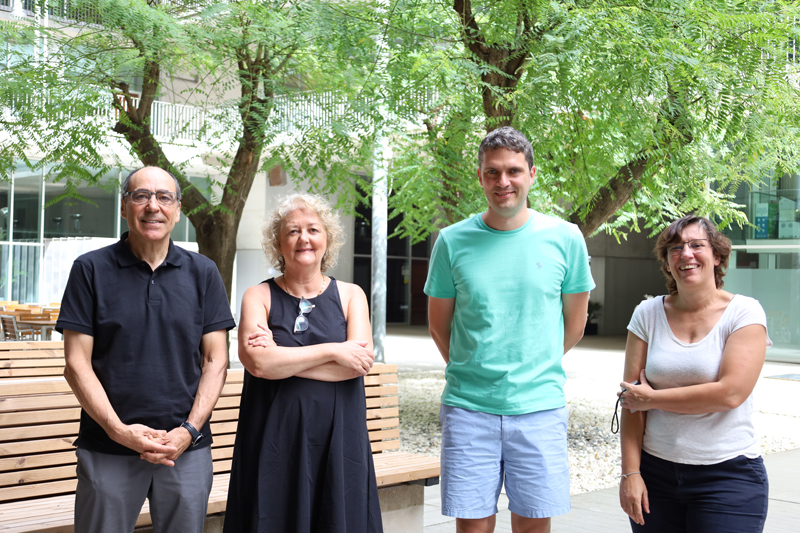
07/09/2023 - Covid-19
Women with a higher educational level were the ones who saw their health worsen the most as a result of the COVID-19 pandemic. Moreover, in general, the inequalities between the different groups analyzed according to their educational level were reduced in the period after strict confinement, according to a study led by the Health Services Research Group of the Hospital del Mar Research Institute, within the MINDCOVID project, which analyzes how the pandemic has affected the evolution of health in the general population and healthcare professionals.
The results have surprised the researchers, as acknowledged by the first author of the study, Isabel Moreira. "Our initial hypothesis was that the pandemic might have increased the already existing inequalities in health in relation to the different educational levels. Our surprise has been that, not only have they not increased, but they have maintained or reduced," she points out. The study is published in the International Journal for Equity in Health.
The effect of teleworking
The work involved the participation of 2,000 people, interviewed by telephone at two points in time during the pandemic, and divided according to their educational level. The first interview was just after the end of the confinement, in June 2020, and the second call nine months later. Several areas were evaluated in order to be able to analyze the evolution of their quality of life, pain or discomfort, affectation of activities of daily living, anxiety and/or depression, mobility capacity and self-care.
In general, the evolution of health problems was negative in all groups, with better figures in men than in women. The evolution was also less negative in the group of people with lower educational levels, who, despite having a worse starting point, probably in part due to a stronger affectation during the months of strict confinement, reduced or maintained stable the differences regarding people with higher educational levels in all the areas analyzed. In the case of women, the reduction in these inequalities was more pronounced.
The most significant cases were in the areas of pain or discomfort and those of anxiety and depression. The differences between women with lower and higher levels of education were reduced by 7%, while in men the reduction was more modest (6% and 3%, respectively). "Teleworking is a determining factor that we believe explains this evolution," says explains Montse Ferrer, a researcher at the Hospital del Mar Research Institute, "since women with a higher level of education had to combine working from home and caring for the family, a fact that did not affect men in the same way." Having young children or older dependents had a greater impact on women than on men, a group on which having a partner or older relatives at home had a protective effect.
Overall, women report more health problems and worse socioeconomic conditions, and a feeling of a greater lack of protection at work in the face of COVID-19. In this sense, Ferrer points out that "inequalities certainly increased during the strict confinement, but afterwards certain government policies to mitigate the economic impact of the pandemic had a greater impact, especially on the lower educational levels, and made it possible to maintain stable or reduce inequalities regarding those population groups with a higher educational level".
The coordinator of the Health Services Research Group at the Hospital del Mar Research Institute, Dr. Jordi Alonso, notes that "these results illustrate how important it is to continue studying changes in mental health related to the COVID-19 pandemic. The MINDCOVID study, which includes the follow-up of cohorts of the general population, COVID patients and healthcare professionals, is potentially very useful for monitoring social differences in mental health".
This work has received funding from the Instituto de Salud Carlos III (Ministerio de Ciencia e Innovación/FEDER grant number COV10/0071 1) and the Generalitat de Catalunya-AGAUR (grants number 2021SGR00624 and 2017SGR452). The study has counted with the participation of the CIBER de Epidemiología y Salud Pública (CIBERESP) and Parc Sanitari Sant Joan de Déu.

From left to right, Jordi Alonso, Montse Ferrer, Phlippe Mortier, Gemma Vilagut.

Isabel Moreira
Reference article
Moreira I, Ferrer M, Vilagut G, Mortier P, Felez-Nobrega M, Domènech-Abella J, Haro JM, Alonso J. Social inequalities in mental and physical health derived from the COVID-19 pandemic in Spain beyond SARS-CoV-2 infection. Int J Equity Health. 2023 Jul 24;22(1):136. doi: 10.1186/s12939-023-01933-3. PMID: 37488575; PMCID: PMC10367254.
Servei de Comunicació:
Marta Calsina Freixas(ELIMINAR)
Tel:
(+34) 93 316 06 80
Doctor Aiguader, 88
08226 Barcelona
© Institut Hospital del Mar
d'Investigacions MèdiquesLegal Notice and Privacy Policy | Cookie Policy | Site Index | Accessibility | Find Us | Contact